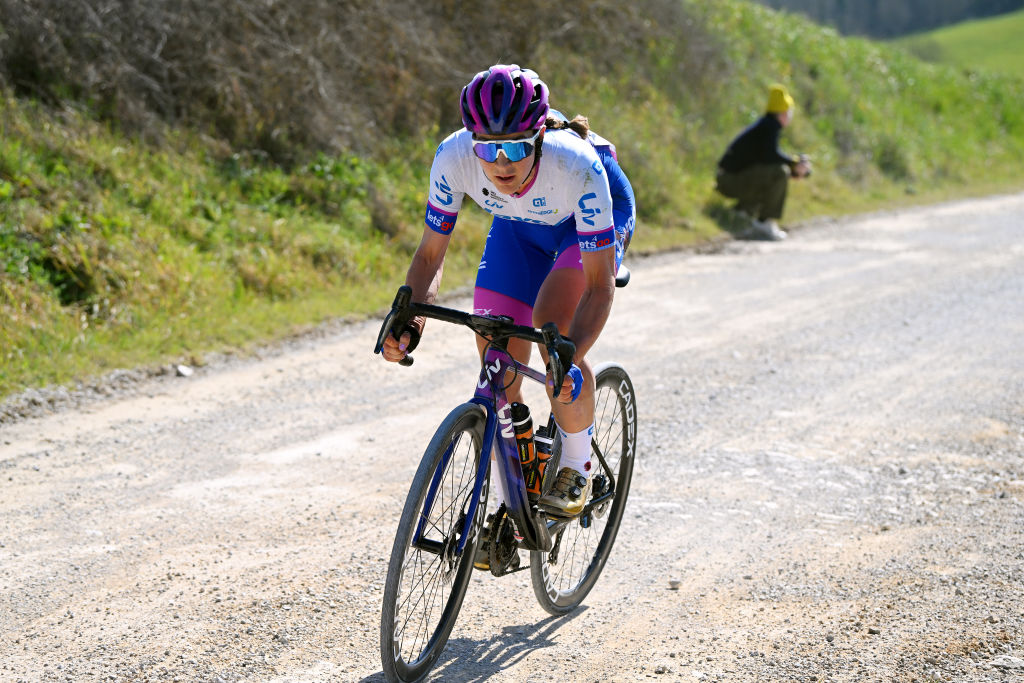Kristen Faulkner 'extremely disappointed' by UCI Strade Bianche disqualification decision
'I have never used glucose data in competition, which I provided ample evidence of to the UCI' says Jayco-AlUla rider

Kristen Faulkner has responded following her disqualification from Strade Bianche, saying in a statement that while she appreciates the UCI putting in the time and effort to uphold professional standards she was 'extremely disappointed' with the decision to take away her third place at the race due to the presence of a non-connected glucose monitoring sensor.
"I have never used glucose data in competition, which I provided ample evidence of to the UCI," said Faulkner in a statement on Twitter. "I complied with all the UCI requests and sent them an honest, detailed explanation with evidence that no race data was ever transmitted during or after the race.
"I was under the impression that I could race with my device if it did not record any data, because there was no performance advantage whatsoever. The UCI holds the position that wearing a non-connected patch itself - even if there is no transmission of data and no performance advantage - is enough to disqualify me."
After the March 4th race, Faulkner stepped up onto the podium, having launched off the front for a 31km solo effort before succumbing to the chase of the SD Worx duo of Demi Vollering and Lotte Kopecky within the final kilometre. However, there continued to be considerable discussion on social media and beyond about the device, a SuperSapiens glucose monitor, which was visible underneath her jersey on her left arm.
Then on Tuesday of this week the UCI confirmed that the rider had been disqualified and the results changed because of a "breach of article 1.3.006bis of the UCI Regulations due to the wearing of a continuous glucose monitoring sensor throughout the event". Cecilia Uttrup Ludwig (FDJ-Suez) was awarded third instead.
"My intent was not to violate any rules or gain an unfair advantage," said Faulkner. "I am proud of how I raced Strade Bianche and I am extremely disappointed in the UCI's decision.
"I also hope that one day glucose monitors are allowed in racing. I believe they are a valuable tool for athletes - especially women - to take care of our physical health, though that is a conversation for another time."
The latest race content, interviews, features, reviews and expert buying guides, direct to your inbox!
The devices are widely used in other sports and by professional cyclists in training, to control their feeding and energy levels. The UCI, however, hasn't heeded calls from teams and glucose monitor makers to allow the technology to be used in racing.
Faulkner had not originally been on the roster for Strade Bianche, and had apparently fitted a new monitor to her arm before being called up as a reserve. The rider capitalised on the late call-up, and open role, by stepping onto her first podium of 2023 and, while the result may not have stayed on the books, the race remains a clear display of the powerful form the 30-year-old is carrying as the season builds.
"I look forward to the rest of the season and I hope that Strade Bianche is one of many World Tour podiums to come," said Faulkner.
pic.twitter.com/8Xy0Wd6PC1March 15, 2023

Simone is a degree-qualified journalist that has accumulated decades of wide-ranging experience while working across a variety of leading media organisations. She joined Cyclingnews as a Production Editor at the start of the 2021 season and has now moved into the role of Australia Editor. Previously she worked as a freelance writer, Australian Editor at Ella CyclingTips and as a correspondent for Reuters and Bloomberg. Cycling was initially purely a leisure pursuit for Simone, who started out as a business journalist, but in 2015 her career focus also shifted to the sport.
